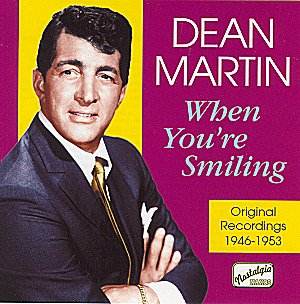 CD Reviews
CD Reviews MusicWeb
Webmaster: Len Mullenger
Len@musicweb.uk.net
[Jazz index][Purchase CDs][ Film MusicWeb][Classical MusicWeb][Gerard Hoffnung][MusicWeb Site Map]

When Youíre Smiling: Original 1946-1953 Recordings
Crotchet Budget price
I Got The Sun In The Morning [2:51]
O Marie [2:32]
All Of Me [2:51]
Walkiní My Baby Back Home [2:56]
The Money Song [3:11]
You Was [2:49]
Powder Your Face With Sunshine (Smile! Smile! Smile) [2:35]
That Lucky Old Sun [3:03]
Vieni Su (Say You Love Me Too) [2:41]
Muskrat Ramble [3:06]
Iíll Always Love You (Day After Day) [2:35]
I Donít Care If The Sun Donít Shine [1:57]
We Never Talk Much [2:49]
In the Cool, Cool, Cool Of The Evening [3:00]
Luna Mezzo Mare [2:08]
Come Back To Sorrento (Torna a Surriento) [3:13]
When Youíre Smiling [3:03]
You Belong To Me [3:04]
Thatís Amore [3:09]
I Feel A Song Coming On [1:54]
Recorded in New York, NY from July 1946 - October 1947 and in Hollywood, CA from 13 September 1948-13 August 1953
Dean Martin is one of those incredibly charismatic figures that undeniably left his mark on everything he touched. First as the straight-man to Jerry Lewis then the first-lieutenant to Frank Sinatra in the Rat Pack, Dean was the essence of the American swinger in the 1940s and 1950s. Even though he was largely an actor and comedian, his musical talents were always at the core of his entertainment value. He was discovered as a singer and crooned his way through the war years and the decades that followed.
This album is an attempt to capture him at his most polished, cavalier, and entertaining. Indeed, the era from which all of these recordings come is representative of his creative height. He teamed with Jerry Lewis for the first time in 1946, and that is truly when his career took off. Thus, while he had already been singing and recording for several years previously, it makes sense that the earliest recordings here are from that year. Included here is The Money Song, one of the many duets that the Lewis-Martin duo recorded. Its manic energy is one of the highlights of the album contrasting the debonair that Martin epitomised with the comic insanity of his partner.
Peggy Lee also makes an appearance on the album in the duet You Was, a delightful swing era romantic-comedy duet. While Dean Martinís British accent rivals Dick Van Dykeís for the worst in recorded history, the charm and good humor just oozes out of the speakers and across the years making it impossible not to forgive him for his humorous indulgence. His third duet is with the lesser known singer Helen OíConnell on We Never Talk Much. Though she is easily the least well known of the guest singers on this collection, this is probably the best of the duets here. There is no shtick here to distract from the music. However it still good-natured and light-hearted, while still being very well sung and performed.
The album does a decent job of presenting the listener with a fairly representative cross-section of his solo work from the immediately post-war era as well. The majority of the songs are straight-ahead swing tunes or ballads in the Frank Sinatra mold. Martin also characteristically experimented with Italian on songs such as in Vieni Su, Luna Mezzo Mare, and Come Back To Sorrento. In contrast, Muskrat Ramble is a Dixieland influenced jump tune that makes it difficult to sit still. Then hearkening toward German and French cabaret jazz is Iíll Always Love You. It may be sung in English but with accordion and strings that hearken to Weill and Berecht. Of course, no Dean Martin collection is complete without his signature song Thatís Amore. This rendition is a gem.
The remastering is quite good on this collection. The sound is bright and robust. There is no trace of album noise or tape distortion. The horn sections are vivid and strings full bodied and velveteen. One can hardly expect a better result from these master recordings. This is a textbook example of what can be achieved through modern remastering techniques.
The sole complaint that one could have is that this is not a truly definitive collection. Many of the Martin-Lewis recordings that actually charted, and are even referred to in the liner notes were left off of this collection. However, this is certainly a solid snapshot of Dean Martin during the height of his early career, and of him as a solo artist.
Patrick Gary